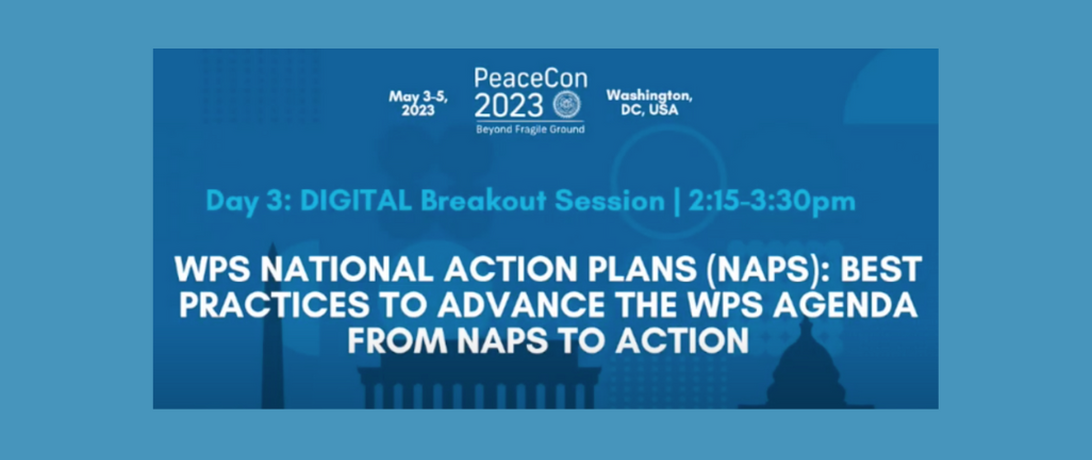
On May 5, 2023 Our Secure Future presented at Alliance for Peacebuilding’s PeaceCon 2023.
PeaceCon 2023 convened senior officials, thought leaders, policymakers, and practitioners to explore how the field must evolve, to strengthen existing instruments of peacebuilding, and to create new strategic approaches.
Our Secure Future showcased its session: “WPS National Action Plans: Best Practices to Advance the WPS Agenda from NAPs to ACTion.” Through an exploration of case studies around the world, including Canada, Uganda, Niger, and the United States, this session discussed the successes and challenges to National Action Plan (NAP) and WPS policy implementation, lessons learned, and how to most effectively advance the WPS agenda globally. OSF Director Sahana Dharmapuri moderated the discussion with the following panelists:
- Moussa Abdou, Chief of Party, Counterpart International
- Mavic Cabrera Balleza, Founder & CEO, Global Network of Women Peacebuilders (GNWP)
- Namuddu Hadijah, Program Officer for Women, Peace and Security, UN Women Uganda
- Grace Klein, WPS Project Specialist, Our Secure Future
- Elinor McNamee, Senior Advisor and Team Lead, Global Affairs Canada
During opening remarks, Ms. Dharmapuri provided background on key WPS policy and defined WPS National Action Plans as a tool policymakers can use to define and operationalize the WPS agenda and promote gender-responsive conflict prevention, mitigation, and peacebuilding. Our Secure Future Project Specialist, Grace Klein, followed with an overview of the current landscape of WPS NAPs and highlighted key findings from OSF research on financing NAPs. She outlined key aspects of a high-impact NAP including political support, financing, monitoring and evaluation, and coordination mechanisms.
Moussa Abdou discussed Counterpart International’s Women for Change project that supports women leaders in Niger to better understand their roles in implementing the NAP. The project disseminates information about the NAP at the local level and facilitates workshops at the national level for members of eight regions in Niger. Women for Change aims to tackle the barriers to involvement of women in decision-making through training, empowerment, and information sharing.
Mavic Cabrera explained that GNWP advocates for a “whole of nation” approach to NAPs because governance is not just the responsibility of government officials but also of civil society, citizens, and refugees in the country. NAPs have become tools for advocating for the nexus of peace and security and humanitarian crises. As an example, in Bangladesh women leaders have advocated for the inclusion of the response to the Rohingya refugee crisis to be integrated into the NAP. Ms. Cabrera also focused on the importance of localization for the implementation of WPS. GNWP is working on localization efforts in 30 countries which brings together government leaders, community elders, faith leaders, and grassroots women organizations. There are 3 potential products of localization: a standalone local NAP, an ordinance, or the integration of WPS into community development plans.
Elinor McNamee provided a government perspective on the implementation of the Canadian NAP. She shared lessons learned and best practices from Canada’s first two NAPs. The WPS NAP is part of a larger ecosystem of Canadian government priorities. In developing their third NAP, the government is working to improve storytelling by using monitoring and evaluation tools to tell success stories of WPS implementation. They are also building more flexibility into the NAP to account for changing conditions. Governments often struggle to track how much money is spent on WPS because WPS is being mainstreamed into institutions, agencies, and departments. Ms. McNamee highlighted that the consultation process with civil society is critical, but governments should be thoughtful and strategic of questions asked to civil society. Canada’s consultation process for the third NAP also included bilateral engagements with countries who had recently developed their NAPs. This was an opportunity to share best practices in a smaller forum.
Namaddu Hadijah also highlighted lessons learned from Uganda’s first two NAPs, including funding mechanisms. Because the first two NAPs were not costed it was difficult for implementers to mobilize resources. Therefore, Uganda’s third NAP costed all activities and broke down the costs into priority outcomes. In Uganda, funding is donor driven. The government, in collaboration with UN Women, has held donor roundtable meetings to brief them about NAP implementation. UN Women encourages ministries to align NAP activities to existing budgets. Another lesson learned was the importance of developing a communications strategy. The third NAP has a strategy aimed at knowledge sharing between all WPS stakeholders.
You can watch the full panel discussion here: https://www.youtube.com/watch?v=R0qtwf3qh74